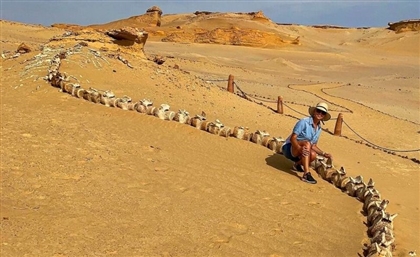Giant Prehistoric Whale Fossils Await in Egypt's Wadi al-Hitan
Perhaps, its greatest claim to fame is that it holds the secret to one of evolution’s most extraordinary transformations.

In Egypt’s Western Desert, just 130 kilometres south-west of Cairo, the governorate of Fayoum is known for its fertile oases that bloom amidst the vastness of its dry mountains and valleys. Named after the Coptic word for ‘Lake’, Fayoum is the home of humble pottery centres, acres of farmland, and architectural treasures like the Greco-Roman Fayoum mummies, which were famously buried with their true-to-life portraits. But for those who venture beyond the pockets of civilization found within its villages, out into the wilds of the desert, they may find hints of its prehistoric past - when the lakes of Fayoum were instead part of the vast Tethys Ocean, teeming with colossal marine life.
Wadi Al-Hitan - Arabic for ‘Valley of the Whales’ - was named a UNESCO World Heritage Site in 2005 due to its growing collection of 400 fossils of prehistoric marine life. Perhaps the most prominent of these is the Basilosaurus Isis, a 36 million-year-old ancestor of the modern whale known for its hind legs, whose ridged skeleton pierced through the dunes at a length of about 18 metres and now serves as the centrepiece of Fayoum’s Fossil & Climate Change Museum.
Much like its contents when they were first discovered, the Fossil & Climate Change Museum is half-buried within the ground. From the outside, you can see its domed roof and vaults, its sandy exteriors camouflaging seamlessly with its desert surroundings. Built with support from the Egyptian Ministry of Environment, the government of Italy, and the United Nations Development Programme, the museum contains many of the valley’s native fossils, including dolphins, sharks and crocodiles, as well as plants like mangroves, coral and watermelons. Beyond its unique collection, the museum is one of the few in the Middle East that highlights the effects of climate change, and actively promotes the sustainable use of natural resources.
All visitors entering Egypt, including nationals, must be in possession of a negative PCR test taken at a maximum of 72 hours before their flight.
- Previous Article Dr.Sisilove or How (Not) To Diffuse A Bomb
- Next Article Egyptian Rapper Perrie Releases First Track from Upcoming EP '12:01AM'
Trending This Week
-
Apr 13, 2024
























